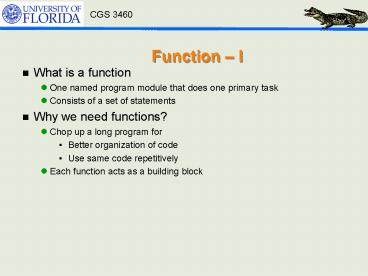Function I - PowerPoint PPT Presentation
1 / 11
Title:
Function I
Description:
CGS 3460. Function I. What is a function. One named ... double CalcArea(double hight, double width) return height * width; int main() double h, w, area; ... – PowerPoint PPT presentation
Number of Views:62
Avg rating:3.0/5.0
Title: Function I
1
Function I
- What is a function
- One named program module that does one primary
task - Consists of a set of statements
- Why we need functions?
- Chop up a long program for
- Better organization of code
- Use same code repetitively
- Each function acts as a building block
2
Example Area Calculation
- double CalcArea(double hight, double width)
- return height width
- int main()
- double h, w, area
- printf(Please input height and width\n)
- scanf(f, f, h, w)
- area CalcArea(h, w)
- printf(The area is f, area)
- return 0
3
Example II
- Compute the factorials
- double factorial(int n)
- double result 1
- int i
- for( i 2 i lt n i)
- result result i
- return result
4
Example factorials
- 5! 5 4 3 2 1
- Notice that
- 5! 5 4!
- 4! 4 3! ...
- Can compute factorials recursively
- Solve base case (1! 0! 1) then plug in
- 2! 2 1! 2 1 2
- 3! 3 2! 3 2 6
- factorial(5) 5 factorial(4)
5
Example factorials
- factorial(n) n factorial(n-1)
- double factorial(int n)
- double result
- if ( n lt 1 )
- return 1
- else
- result n factorial(n 1)
- return result
Does this code work?
6
Recursive Function Call
- double factorial(int n)
- if ( n lt 1 )
- return 1
- else
- return (n factorial(n 1))
double factorial(int n) if ( n lt 1 ) return
1 else return (n factorial(n 1))
n4
n3
return (4 factorial(4 1))
return (3 factorial(3 1))
6)
factorial( 3))
factorial( 2))
2)
double factorial(int n) if ( n lt 1 ) return
1 else return (n factorial(n 1))
double factorial(int n) if ( n lt 1 ) return
1 else return (n factorial(n 1))
n1
n2
return 1
return (2 factorial(2 1))
factorial( 1))
1)
7
Recursion
- Recursive functions
- Functions that call themselves
- Can solve a base case or base cases
- Divide a problem up into
- Base case(s), which is what it can do
- Others
- The function launches a new copy of itself
(recursion step), leading to base case(s) - Eventually base case gets solved
- Gets plugged in, works its way up and solves
whole problem
8
Recursive Approaches
- Recursive function is called to solve a problem
- Know how to solve only the simplest case(s), or
so-called base case(s) - Resemble a complex problem in a simpler or
smaller version of the same problem. - Execution
- The recursion step execute while the original
call to the function is still open, i.e., it has
not yet finished. - May be many recursive calls.
- All calls converge on the base case(s)
9
Example
- Function power(base, exponent) which returns
baseexponent - Recursion relationship
- baseexponent base baseexponent-1
- Base case
- base1 base
10
Code
- double power(float base, int exponent)
- if (exponent 1)
- return base
- else
- return( base power(base, exponent-1))
11
Fibonacci series
- Fibonacci series 0, 1, 1, 2, 3, 5, 8...
- Each number is the sum of the previous two
- Can be solved recursively
- fib( n ) fib( n - 1 ) fib( n 2 )
- Code for the fibaonacci function
- long fib( int n )
- if (n 0 n 1) // base case
- return n
- else
- return( fib( n - 1) fib( n 2 ) )































